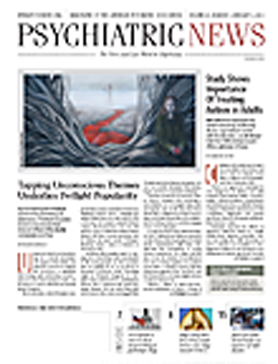New research on alleged overuse of psychotropic medications in both nursing-home and foster-care settings signals a need for better training of nonpsychiatric physicians and increased funding to bolster the mental health workforce, stated APA in recently submitted congressional testimony.
On November 30, 2011, the Senate Special Committee on Aging held a hearing exploring an audit issued earlier in the year by the Department of Health and Human Services’ (HHS) Office of Inspector General (OIG). The report found that 14 percent of nursing-home residents were prescribed an atypical antipsychotic during the first six months of 2007.
One day later, the Senate Homeland Security and Government Affairs’ Subcommittee on Federal Financial Management, Government Information, Federal Services, and International Security heard testimony from the Government Accountability Office (GAO) that foster children are prescribed psychotropic drugs at a significantly higher rate than children not in foster care.
Conducted at the request of Sen. Charles Grassley (R-Iowa), the OIG’s report evaluated the extent to which nursing-home residents over age 65 receive atypical antipsychotics, as well as the cost to Medicare associated with these prescribing practices. Grassley had voiced concern about prescription of these drugs for off-label conditions and/or in the presence of dementia. (Antipsychotics carry a black-box warning of an increased risk of death in elderly patients with dementia.)
According to the OIG, 20 percent of the 8.5 million Medicare claims made for atypical antipsychotics during the review period were submitted on behalf of elderly nursing-home residents. Of these claims, 83 percent were associated with off-label conditions and 88 percent were associated with dementia.
The report also found that 51 percent of the nursing-home claims failed to comply with Medicare reimbursement criteria, at a cost of $116 million. In these instances, the drugs were either not used for medically accepted indications or not documented as having been administered to the residents.
Additionally, 22 percent of the anti-psychotics for which reimbursement claims were filed were not administered in accordance with standards issued by the Centers for Medicare and Medicaid Services (CMS) regarding drug regimens in nursing homes.
Reason for Prescription Not Evaluated
“The report didn’t investigate why patients with dementia are prescribed antipsychotic drugs so often,” noted OIG Inspector General Daniel Levinson in a May 31, 2011, editorial for CNN. “But a series of lawsuits and settlements that my office helped bring about suggests that many pharmaceutical companies have improperly promoted these drugs to doctors and nursing homes for many years.”
The OIG recommended the following courses of action for CMS to take in ensuring that payments for these drugs are correct and that nursing-home residents are not being medicated unnecessarily:
Facilitate access to information necessary to ensure accurate coverage and reimbursement determinations.
Assess whether survey and certification processes offer adequate safeguards against unnecessary antipsychotic use.
Explore alternative methods beyond survey and certification processes to promote compliance with federal standards.
Take appropriate action regarding the claims associated with erroneous payments identified in the study.
CMS concurred with all but the first recommendation, stating that diagnosis information is neither a required data element of pharmacy billing transactions nor generally included on prescriptions.
In its statement to the Senate hearing on this issue, APA referred to its 2007 practice guideline on the treatment of patients with Alzheimer’s disease and other forms of dementia, stressing that APA “strongly supports the use of nonpharmacological interventions and regular psychosocial treatments for patients with dementia.”
“Our guidelines recommend that off-label usage of antipsychotics in low doses be considered as a treatment option when a moderately, severely, or profoundly impaired patient’s psychotic symptoms cause significant distress or threaten the lives and safety of others,” said APA Medical Director James Scully Jr., M.D. “We urge physicians to weigh very carefully the potential benefits of antipsychotics . . . with their potential drawbacks.”
“APA strongly opposes any practice or pattern of prescribing antipsychotics for reasons of convenience or without clear medical indicators,” Scully added.
Are Foster Children Overmedicated?
On another issue related to concerns about use of antipsychotics, the GAO in recent congressional testimony compared the number of foster children being prescribed psychotropic medications in 2008 with the rate of prescriptions for nonfoster children and examined state oversight of psychotropic prescriptions for foster children through October 2011.
While APA acknowledged in its statement in conjunction with the Senate hearing that children in foster-care systems experience high rates of mental illness, it voiced support for the GAO’s recommendation that HHS issue formal guidance to state Medicaid and child-welfare agencies on best practices for monitoring the prescription of psychotropic medications for foster children.
“APA strongly believes psychotropic medications must be prescribed only when appropriately deemed necessary, and must form part of a larger customized treatment plan that includes both psychopharmacologic and psychosocial interventions,” Scully said in his testimony.
The OIG’s report on antipsychotics in nursing-home residents is posted at http://oig.hhs.gov/oei/reports/oei-07-08-00150.asp. GAO’s testimony on psychotropic prescriptions for foster children is posted at www.gao.gov/products/GAO-12-270T. APA’s statements can be accessed at www.psych.org.

